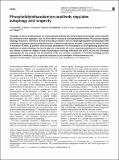Files in this item
Phosphatidylethanolamine positively regulates autophagy and longevity
Item metadata
| dc.contributor.author | Rockenfeller, P. | |
| dc.contributor.author | Koska, M. | |
| dc.contributor.author | Pietrocola, F. | |
| dc.contributor.author | Minois, N. | |
| dc.contributor.author | Knittelfelder, O. | |
| dc.contributor.author | Sica, V. | |
| dc.contributor.author | Franz, J. | |
| dc.contributor.author | Carmona-Gutierrez, D. | |
| dc.contributor.author | Kroemer, G. | |
| dc.contributor.author | Madeo, F. | |
| dc.date.accessioned | 2015-03-16T17:01:08Z | |
| dc.date.available | 2015-03-16T17:01:08Z | |
| dc.date.issued | 2015-03 | |
| dc.identifier | 174965088 | |
| dc.identifier | 6b77822a-352b-499d-bbee-1b8832530d2e | |
| dc.identifier | 000349543600014 | |
| dc.identifier | 84922576844 | |
| dc.identifier | 000349543600014 | |
| dc.identifier.citation | Rockenfeller , P , Koska , M , Pietrocola , F , Minois , N , Knittelfelder , O , Sica , V , Franz , J , Carmona-Gutierrez , D , Kroemer , G & Madeo , F 2015 , ' Phosphatidylethanolamine positively regulates autophagy and longevity ' , Cell death and differentiation , vol. 22 , no. 3 , pp. 499-508 . https://doi.org/10.1038/cdd.2014.219 | en |
| dc.identifier.issn | 1350-9047 | |
| dc.identifier.uri | https://hdl.handle.net/10023/6250 | |
| dc.description | This work was supported by the Austrian Science Fund FWF (grants LIPOTOX, I1000-B20, P23490-B12, and P24381-B20) to FM. The authors acknowledge support from NAWI Graz. OK is a member of the PhD program ‘Molecular Enzymology’, funded by the FWF (project W901-B12). GK is supported by the Ligue contre le Cancer (équipe labelisée); Agence National de la Recherche (ANR); Association pour la recherche sur le cancer (ARC); Cancéropôle Ile-de-France; Institut National du Cancer (INCa); Fondation Bettencourt-Schueller; Fondation de France; Fondation pour la Recherche Médicale (FRM); the European Commission (ArtForce); the European Research Council (ERC); the LabEx Immuno-Oncology; the SIRIC Stratified Oncology Cell DNA Repair and Tumour Immune Elimination (SOCRATE); the SIRIC Cancer Research and Personalized Medicine (CARPEM); and the Paris Alliance of Cancer Research Institutes (PACRI). | en |
| dc.description.abstract | Autophagy is a cellular recycling program that retards ageing by efficiently eliminating damaged and potentially harmful organelles and intracellular protein aggregates. Here, we show that the abundance of phosphatidylethanolamine (PE) positively regulates autophagy. Reduction of intracellular PE levels by knocking out either of the two yeast phosphatidylserine decarboxylases (PSD) accelerated chronological ageing-associated production of reactive oxygen species and death. Conversely, the artificial increase of intracellular PE levels, by provision of its precursor ethanolamine or by overexpression of the PE-generating enzyme Psd1, significantly increased autophagic flux, both in yeast and in mammalian cell culture. Importantly administration of ethanolamine was sufficient to extend the lifespan of yeast (Saccharomyces cerevisiae), mammalian cells (U2OS, H4) and flies (Drosophila melanogaster). We thus postulate that the availability of PE may constitute a bottleneck for functional autophagy and that organismal life or healthspan could be positively influenced by the consumption of ethanolamine-rich food. | |
| dc.format.extent | 10 | |
| dc.format.extent | 2527408 | |
| dc.language.iso | eng | |
| dc.relation.ispartof | Cell death and differentiation | en |
| dc.subject | Yeast saccharomyces-cerevisiae | en |
| dc.subject | Lipid droplet formation | en |
| dc.subject | Phosphatidylserine decarboxylase | en |
| dc.subject | Subcellular membranes | en |
| dc.subject | Monitoring autophagy | en |
| dc.subject | Protein lipidation | en |
| dc.subject | Differnet pathways | en |
| dc.subject | Mammalian-cells | en |
| dc.subject | Life-span | en |
| dc.subject | Gene | en |
| dc.subject | QR Microbiology | en |
| dc.subject | NDAS | en |
| dc.subject.lcc | QR | en |
| dc.title | Phosphatidylethanolamine positively regulates autophagy and longevity | en |
| dc.type | Journal article | en |
| dc.contributor.institution | University of St Andrews. School of Biology | en |
| dc.identifier.doi | 10.1038/cdd.2014.219 | |
| dc.description.status | Peer reviewed | en |
This item appears in the following Collection(s)
Items in the St Andrews Research Repository are protected by copyright, with all rights reserved, unless otherwise indicated.

